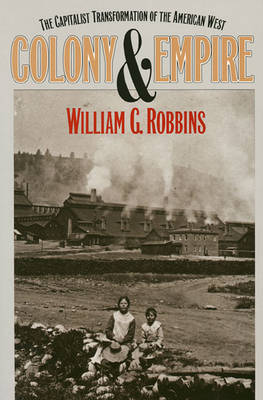
- Afhalen na 1 uur in een winkel met voorraad
- Gratis thuislevering in België vanaf € 30
- Ruim aanbod met 7 miljoen producten
- Afhalen na 1 uur in een winkel met voorraad
- Gratis thuislevering in België vanaf € 30
- Ruim aanbod met 7 miljoen producten
Zoeken
€ 34,95
+ 69 punten
Omschrijving
Popular writers and historians alike have perpetuated the powerful myth of the rugged-individualist single-handedly transforming the American West. In reality, William Robbins counters, it was the Guggenheims and Goulds, the Harrimans and Hearsts, and the Morgans and Mellons who masterminded what the West was to become. Remove the romance, he shows, and a darker West emerges--a colonial-like region where "industrial statesmen," aided by eastern U.S. and European capital, manipulated investments in pursuit of private gain while controlling wage-earning cowboys and miners. Robbins argues that understanding the impact of capitalism on the West--from the fur trade era to the present--is essential to understanding power, influence, and change in the region. Showing how global capitalism had a more profound impact on the modern West than individual initiative, he explores violence and racism along the Texas/Mexican border; colonial-style company towns in Montana and the Northwest; contrasting traditions astride the U.S./Canadian boundary; pace-setting agribusiness and exploitation of labor in California; the growing power of metropolitan centers and dependence of rural areas; and the emergence of a sizable federal influence. To grasp the essence of the West's dramatic transformation, Robbins contends, you must look to the mainstays of material relations in the region--the perpetually changing character of political and economic culture; the inherent instability of resources; and the larger constellations of capitalist decision making. Consequently, he shows shy Western success and failure, prosperity and misfortune, and expansion and decline were all inseparably linked to the evolution of capitalism at the local, regional, national and global levels. In the tradition of Patricia Nelson Limerick's Legacy of Conquest, Robbins's study challenges some of our most revered images of the West and invigorates the ongoing debates over its history and meaning for our nation.
Specificaties
Betrokkenen
- Auteur(s):
- Uitgeverij:
Inhoud
- Aantal bladzijden:
- 274
- Taal:
- Engels
- Reeks:
Eigenschappen
- Productcode (EAN):
- 9780700607501
- Verschijningsdatum:
- 28/10/1994
- Uitvoering:
- Paperback
- Formaat:
- Trade paperback (VS)
- Afmetingen:
- 152 mm x 228 mm
- Gewicht:
- 367 g

Alleen bij Standaard Boekhandel
+ 69 punten op je klantenkaart van Standaard Boekhandel
Beoordelingen
We publiceren alleen reviews die voldoen aan de voorwaarden voor reviews. Bekijk onze voorwaarden voor reviews.











